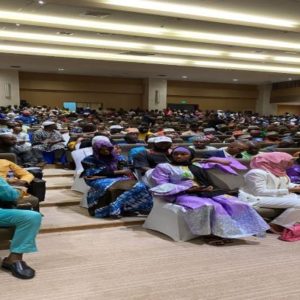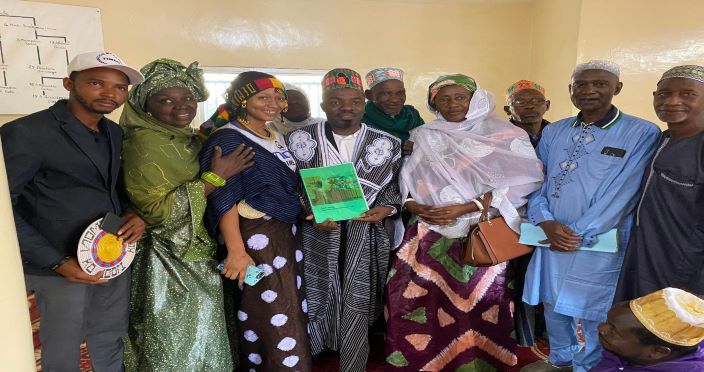PHOTO: Dr. Artemus A.W. Barry Gaye (middle) a 7th generation descendant of the Futa Jallon Empire, flanked by members of the Fulani Community of Liberia
By Garmondeh Wremongar Blojay Joe, II
The direct descendants of the former ruling house of the Futa Jallon Empire whose reign lasted for more than three centuries will formally arrive in Liberia shortly.
Their arrival will mark a significant turning point in the history of the Fulani Community in the West African sub-region aim at reuniting with the original Liberian descendants of Prince Abduhl Rahman and Isabella Rahman.
The five member delegation led by elder El Hadj Oury Mowdy Barry, arrives at RIA on July 24, and departs on the 28 July 2022, after a conclusion of their private family visit which will seal a new relationship between the former ruling family, the vast Fulani community in Liberia, and the lost descendants of the prince in the USA, Liberia, and the greater diaspora.
The delegation will be received on arrival by Dr. Artemus A.W. Barry Gaye, a 7th generation descendant of the Futa Jallon Empire, and other family members.

The coming to Liberia of the heir to the great Futa Jallon Empire to Liberia comes after a recent three-nation Book Tour (Guinea, Sierra Leone & Liberia) by revered Liberian author Dr. Artemus Gaye and his Guinean counterpart Dr. Abu Bakarr Jalloh of Guinea.
Both men detailed the history of the Futa Jallon Empire, its culture, and its tradition to rally the rich past of West Africa’s Fula community.
Dr. Gaye tells the story of how in 1829 and 1831 respectively an African prince and family after enduring 40 years of enslavement in the USA (Natchez, Mississippi) settled in the colony of Liberia.
The prince whose origin was from Guinea was the son of the President or king of Fouta Jallon named Almamy Ibrahima Sori Mowdy Barry, the second leader of the Fulani Theocracy which ruled the vast empire for over 250 years until the French deposed and colonized Guinea in the 1890s.
“A Tossed American Pie: The Controversial Conception & Creation of Liberia by White Americans, Black Repatriates & Liberated Africans” as written by Dr. Artemus lays out a non-fictional account interweaving the personal and collective narratives and experiences of diverse characters- who for a little over 250 years, were directly involved or affected by the decisions leading to the creation of America’s first and closest attempt to forming a colony in Africa; and little later, neglecting its moral obligation due to its own social and political conflicts.
Yet, the settlers under threats from imperial powers, slave dealers, and some Native rulers formed the first Black Republic on African soil–Liberia.
The book which was launched at a massive event Sunday, July 17, 2022, at the Ministerial Complex in Congo Town, in Monrovia says in 1828 through the courtesy of the US government and the American Colonization Society Prince Ibrahima and six members of his family came to Liberia on the ships, The Harriet from Carolina.
The US had hope the prince could establish link with the kingdom of Futa Jalloh in strengthening economic, agriculture, and Christianity but the old man died and was buried here on July 6, 1829 as a Muslim in Monrovia at the age of 66.
Isabella and her children and grandchildren continued to live and contribute to the colony and eventually the nation of Liberia and she is listed as the oldest citizen in the 1843 census and on the Independence Day of Liberia in 1847 at the age of 80.
Said Dr. Gaye: “it’s the rekindling of such historic ties that this visit is built upon”.
According to him, it was through the instrumentality of Mr. Youssouf Barry of Afriland Bank in early 2017 that this bond began when The Prince Ibrahima and Isabella Freedom FDN and the Fulani community officially attended the launch and film screening and book dubbed the Bicentennial commemoration of Liberia’s past at Bella Cassa hotel.
This prompted the discussion of the heritage of the Fulani people to become a regional and global affairs from where he officially launched a three-nation book tour along with his colleagues in Guinea, Sierra Leone, and Liberia, which saw the largest gathering ever for a book lunch in Liberia with more than four thousand in attendance.

Dr Gaye’s book launch at Ministerial Complex
The Fouta Djallon region was settled by the semi-nomadic Fulɓe over successive generations between the 13th and 16th centuries. Initially, they followed a traditional African religion.
In the 16th century an influx of Muslim Fulɓe from Macina, Mali changed the fabric of Fula society.
Futa Jallon soon began slave raiding throughout the region, selling the slaves to European trading houses on the coast, or settling the slaves (hubbu) in agricultural colonies called runde.
By the mid-19th century, slaves made up half of Futa Jallon’s population. Futa Jallon’s theocratic model would later inspire the Fula state of Futa Toro.

